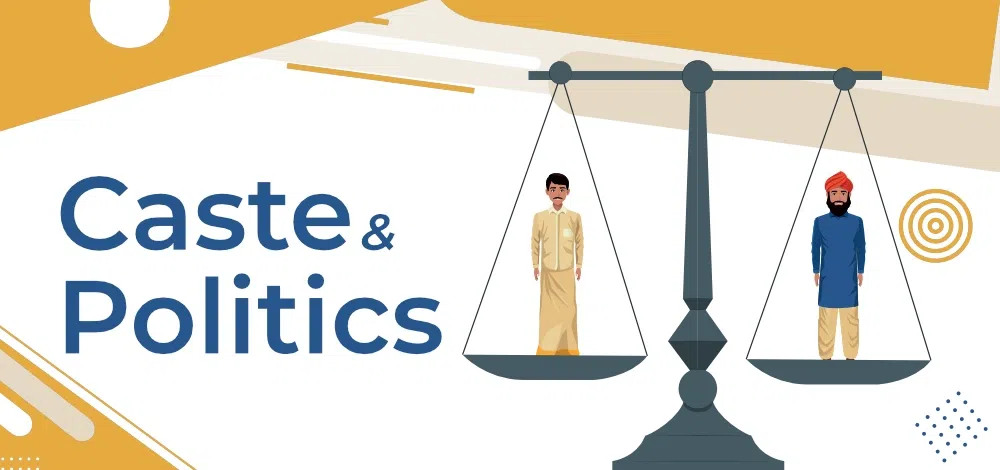Caste and Politics Class 10
Last Updated :
16 Aug, 2023
Caste can take various forms in politics. When parties choose their candidates in elections, the caste composition of the electorate and nominating candidates from different castes are used to muster the necessary support for winning elections.

Caste and Politics
Caste in Politics
Some political parties in elections, keep finding the caste compositions of the electorate and nominate candidates from the different castes which are involved to muster support. Some political parties are known to favor some castes and are seen to be their representatives. The universal adult franchise and also the principle of one person with one vote, have forced political leaders to the task of mobilization and also securing the support to win elections.
Caste is a procedure for sorting individuals into bunches relying on their work. The position is dangerous because it is inherited, has strict support, and partitions individuals into status gatherings. This order keeps bunches at the top from communicating with those underneath them, as well as the other way around. Legislative issues and cast both have helpful and hurtful perspectives.
Caste Inequalities
Unlike gender and religion, caste divisions are special to that India, and in many societies, occupations are also passed on from one to the next generation and caste is an extreme form of the same. The caste system is a system that is based on the system of exclusion and also discrimination of certain outcastes and subjected to some inhumane practices like that untouchability. With the development of the economy and large-scale urbanization, there has been the growth of literacy and education, mobility in occupation, and also weakening of control and power of the village landlords and the old notions of caste hierarchy are breaking down.
Occupation is regularly passed down from one age to another in many nations. This is taken to its obvious result in the position framework. Individuals from a similar position were planned to lay out a social local area that rehearsed something similar or practically identical occupations, wedded inside the standing gathering, and didn’t eat with individuals from other station gatherings, as indicated by this framework. The customary originations of Caste Hierarchy are disintegrating because of monetary advancement, enormous scope urbanization, expanded proficiency and training, position versatility, and the debilitating situation with landowners in networks. The Indian Constitution banned caste-based separation and set the preparation for strategies to address the framework’s disparities.
Politics in Caste
It is mostly the caste that gets politicized and not politics that gets caste-ridden. This can take many different forms:
- Each group of castes tries to become bigger and in doing so incorporates its peripheral castes, which were previously excluded.
- Different caste groups are required to enter into certain partnerships with communities or castes for entering into certain negotiations as well as dialogue.
- New caste groups come up in the arena of politics like that from backward as well as forward caste groups.
Governmental Issues in Caste
The positioning framework and cast personalities are likewise impacted by legislative issues since they are brought into the political field. The following are a couple of guides to back this up-
- Every caste gathering tries to fill in size by engrossing adjoining positions or sub-standings.
- Different caste groupings are framed, and afterward, they take part in correspondence and discussion with different standings or networks.
- In the political field, new cast gatherings have arisen, for example, ‘in reverse’ and ‘forward’ station gatherings. Subsequently, the station plays different capabilities in governmental issues. Station division can prompt pressures, struggle, and even savagery in certain conditions.
The word Caste is gotten from the Portuguese word ‘Casta’ significance breed, race, or kind. First utilized in the limited sense in 1563 when Garcia da Orta composed that ‘nobody changes from his dad’s exchange and every one of those of a similar position of shoemaker are something very similar’. The English word cast could mean either varna or jati. There are four Varnas-Brahmin, Kshatriya, Vaishya, and Shudra. The curious idea of Indian standing construction is that it has a progressively requested separation every station has customarily characterized occupation. Jati alludes to real gatherings with which individuals recognize themselves and structure the premise with which they collaborate.
FAQs on Caste and Politics
Q1: What is the role of caste in politics?
Answer:
The role of one’s caste is to control access to political power, land, and police or judicial assistance. Caste also tends to influence local politics by being local in specific areas.
Q2: What do you mean by caste?
Answer:
Caste refers to the caste hierarchy which means a class structure which is determined by the birth.
Q3: How are caste and politics interrelated in India?
Answer:
Caste and politics are interrelated in India in numerous ways and caste creates social divisions and these divisions compel the government to create different policies and rules.
Like Article
Suggest improvement
Share your thoughts in the comments
Please Login to comment...